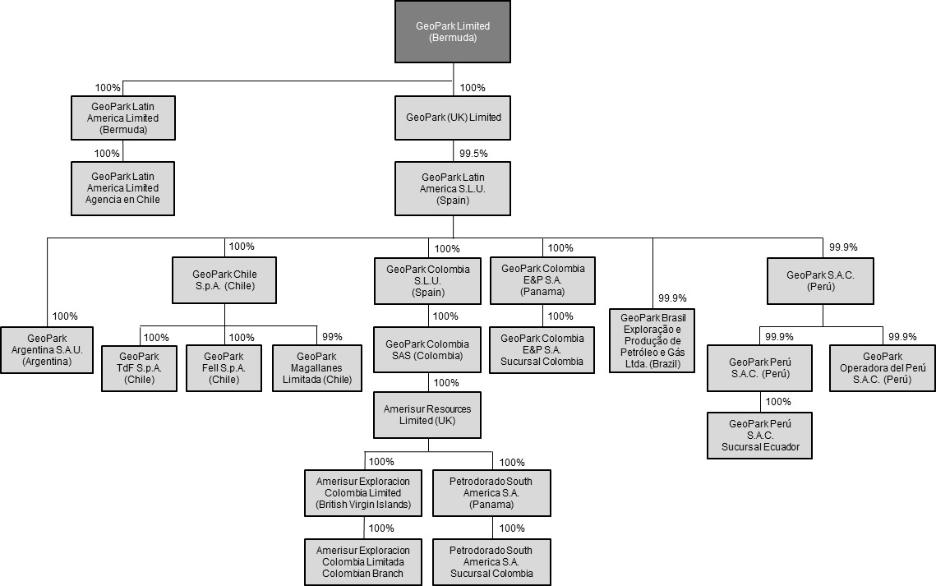Note 3 Financial Instruments-risk management (continued)
Currency risk (continued)
Since December 2018, GeoPark decided to manage its future exposure to local currency fluctuation with respect to income tax balances in Colombia. Consequently, the Group entered into derivative financial instruments with local banks in Colombia, for an amount equivalent to US$ 83,700,000 as of December 31, 2019 and US$ 92,050,000 as of December 31, 2018, in order to anticipate any currency fluctuation with respect to income taxes to be paid during the first half of the following year. As of December 31, 2020, there are no currency risk management contracts in place. The Group’s derivatives are accounted for as non-hedge derivatives and therefore all changes in the fair values of its derivative contracts are recognized as gains or losses in the results of the periods in which they occur. See the impact in the Consolidated Statement of Income in Note 15.
Most of the Group's assets held in those countries are associated with oil and gas productive assets. Those assets, even in the local markets, are generally settled in US Dollar equivalents.
During 2020, the Colombian Peso devalued by 5% (devalued by 1% in 2019 and revalued by 9% in 2018) against the US Dollar, the Chilean Peso revalued by 5% (devalued by 8% in 2019 and revalued by 13% in 2018), the Argentine Peso devalued by 41% (59% and 102% in 2019 and 2018) and the Peruvian Peso devalued by 9% (revalued by 2% in 2019 and devalued by 4% in 2018).
If the Colombian Peso, the Chilean Peso, the Argentine Peso and the Peruvian Peso had each devalued an additional 10% against the US dollar, with all other variables held constant, post-tax loss for the year would have been lower by US$ 9,057,000 (post-tax profit lower by US$ 645,000 in 2019 and US$ 57,000 in 2018).
In Brazil, the functional currency is the local currency, which is the Brazilian Real. The fluctuation of the US Dollars against the Brazilian Real does not impact the loans, costs and revenues held in Brazilian Real; but it does impact the balances denominated in US Dollars. Such is the case of the provision for asset retirement obligation and the lease liabilities. The intercompany loan that also used to be denominated in US Dollars was fully cancelled in October 2018, reducing significantly the exposure to foreign currency fluctuation. The exchange loss generated by the Brazilian subsidiary during 2020 amounted to US$ 4,205,000 (loss of US$ 664,000 in 2019 and US$ 5,862,000 in 2018).
During 2020, the Brazilian Real devalued by 29% against the US Dollar (devalued by 4% in 2019 and devalued by 17% in 2018, respectively). If the Brazilian Real had devalued 10% against the US dollar, with all other variables held constant, post-tax loss for the year would have been higher by US$ 909,000 (post-tax profit lower by US$ 927,000 in 2019 and post-tax profit lower by US$ 515,000 in 2018).
As currency rate changes between the US Dollar and the local currencies, the Group recognizes gains and losses in the Consolidated Statement of Income.
In relation to the cash consideration, of British Pound Sterling (“GBP”) 241,682,496, payable for the acquisition of Amerisur Resources Plc, GeoPark was exposed to fluctuations of the GBP at December 31, 2019. Consequently, the Group decided to manage this exposure by entering into a “Deal Contingent Forward” with a UK Bank, in order to anticipate any currency fluctuation. This forward contract was accounted for as a cash flow hedge as of December 31, 2019 and therefore the effective portion of the changes in its fair value was recognized in Other Reserve within Equity. On January 16, 2020, GeoPark removed that amount from the cash flow hedge reserve and included it directly in the initial cost of the acquired business. See Note 36.1.
